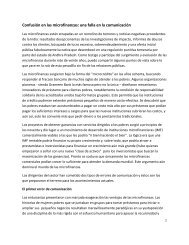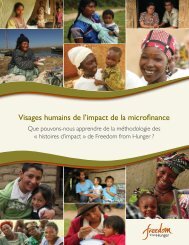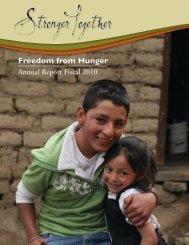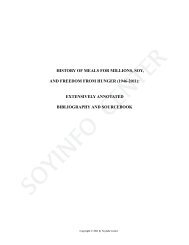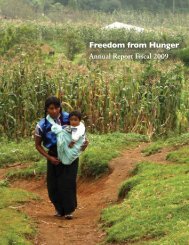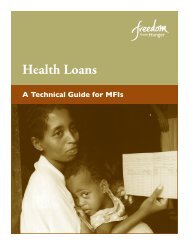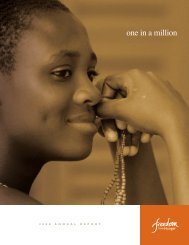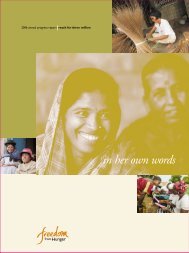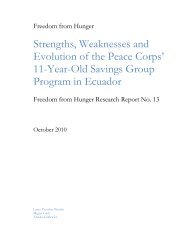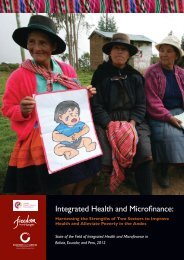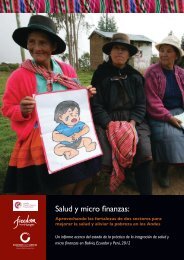Voices from the Frontlines: - Freedom from Hunger
Voices from the Frontlines: - Freedom from Hunger
Voices from the Frontlines: - Freedom from Hunger
You also want an ePaper? Increase the reach of your titles
YUMPU automatically turns print PDFs into web optimized ePapers that Google loves.
To lay <strong>the</strong> groundwork for this study, we highlight here a few studies that have direct relevance to<br />
our study because <strong>the</strong>y have looked at <strong>the</strong> role of credit officers in both delivery of services and<br />
client outcomes:<br />
Schoar 3 documented <strong>the</strong> results of a study on <strong>the</strong> intensity of <strong>the</strong> relationship between an<br />
individual borrower and a credit officer and found that individual borrowers who had a more<br />
intensive interaction with a credit officer during <strong>the</strong> length of <strong>the</strong>ir loan had better repayment<br />
behavior and client satisfaction and were less likely to default on <strong>the</strong>ir loan. She also documents<br />
several o<strong>the</strong>r studies regarding “relationship banking” and generally finds that “soft<br />
information” collected by credit officers and <strong>the</strong> personal relationships built between credit<br />
officers and clients led to better outcomes for clients and <strong>the</strong> supporting institutions alike.<br />
Agier and Szafarz 4 found in Brazil that a gender gap in loan size was attributed to <strong>the</strong> credit<br />
officer’s decision-making. While a significant system of monitoring credit officers would likely<br />
reduce <strong>the</strong>ir gender-bias, it would likely be too expensive. A next-to-best solution would be a<br />
better hiring policy to ensure organizations were hiring credit officers who better matched <strong>the</strong>ir<br />
mission and goals.<br />
Canales 5 looked at three MFIs in Mexico and describes how loan officers systematically bent <strong>the</strong><br />
rules to resolve <strong>the</strong> tension between making decisions for client well-being and adhering to rules<br />
and regulations set out by <strong>the</strong> organization. He finds that this rule-bending often results in<br />
positive outcomes for clients and that credit officers deviate <strong>from</strong> <strong>the</strong> rules not necessarily due<br />
to greed but often due to commitment to client welfare. He concludes that credit officer rulebending<br />
can result in MFIs actually remaining true to <strong>the</strong>ir mission and that MFIs must accept<br />
loan officer discretion as an integral part of <strong>the</strong>ir work and as a useful source of client<br />
information. Organizations that embrace this dynamic can benefit <strong>from</strong> it by using it for learning<br />
and innovation and remaining true to <strong>the</strong>ir mission for social change.<br />
RESEARCH PARTNERS<br />
<strong>Freedom</strong> <strong>from</strong> <strong>Hunger</strong> worked with five MFIs to conduct this research. All five were prior partners<br />
and all five have adopted value-added microfinance as a strategy to reach <strong>the</strong> poor. This means <strong>the</strong>y<br />
use village banking as a platform for reaching groups of primarily poor women and <strong>the</strong>y provided<br />
<strong>the</strong>m with both financial services and non-financial services such as health, business, or financial<br />
education or health services. This means that clients come toge<strong>the</strong>r as a group of approximately 10–<br />
30 people and guarantee each o<strong>the</strong>r’s loans. While <strong>the</strong>y meet biweekly or monthly for repayment of<br />
<strong>the</strong>ir loans and for o<strong>the</strong>r financial transactions, such as savings, <strong>the</strong>y also participate in non-financial<br />
3 Schoar, A. 2012. “The Personal Side of Relationship Banking.” Working Paper. Massachusetts Institute of Technology.<br />
Available at: http://papers.ssrn.com/sol3/papers.cfm?abstract_id=2024653<br />
4 Agier, I and Szafarz, A. 2010. “Credit officers and loan granting in microfinance: Brazilian Evidence.” Available at<br />
http://ssrn.com/abstract=1729234. Accessed January 25, 2013.<br />
5 Canales, R. 2012. “The Stranger as Friend: Loan Officers and Positive Deviance in Microfinance.” Working Paper. Yale School<br />
of Management. Available at: http://mba.yale.edu/faculty/pdf/canales_stranger_friend.pdf<br />
<strong>Voices</strong> <strong>from</strong> <strong>the</strong> <strong>Frontlines</strong> 5



